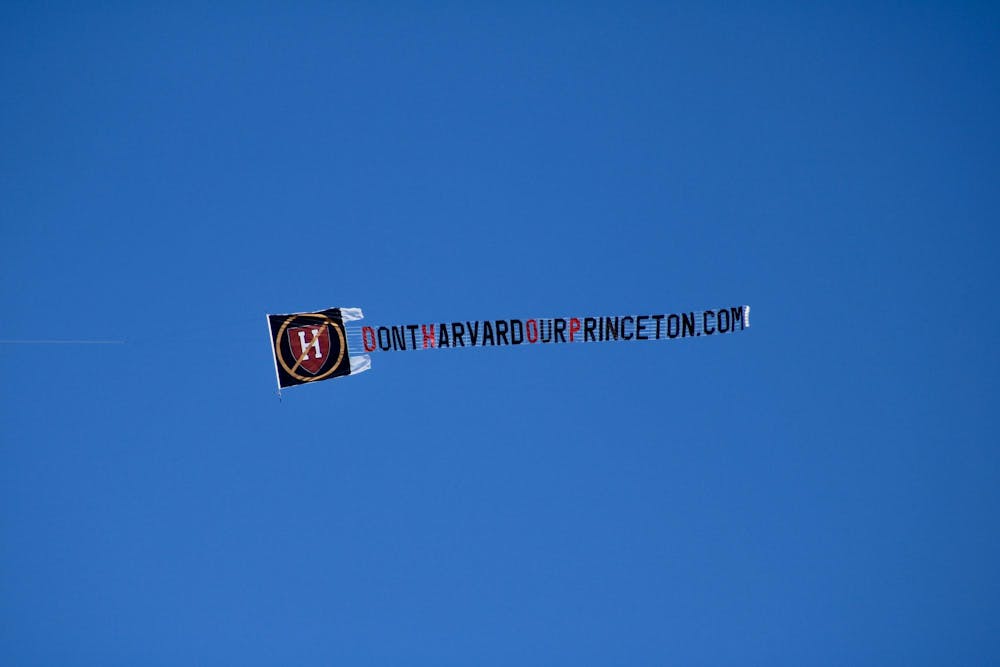Powers Field saw two surprises on Saturday: a monstrous 21-point loss at the Harvard-Princeton homecoming game and a plane flying over with a banner reading “dontharvardourprinceton.com.”
Earlier this month, the University announced that all students on campus would be required to purchase a dining plan, effectively eliminating independent status. Since then, opposition to this change has been steadily ramping up, with the annual Princeton-Harvard football game giving students and alumni the opportunity to publicly express their anger at the change.
The meal plan requirement includes students already in eating clubs and co-ops, who will be able to purchase a $900 Block 32 plan on top of the dues they already pay to their club. Students not currently on a University dining plan will be required to purchase a Block 160 plan at about $4,500 a year or an unlimited meal plan, which is currently about $8,700.
The game marked the official start of the “Don’t Harvard our Princeton” campaign led by the Graduate Interclub Council (GICC) protesting the new dining plan requirement for eating club and co-op members. The policy change, which also eliminates the separate room draw for kitchen-equipped dorms like Spelman Hall, has also garnered significant backlash from independent students.
“We consider this unwelcome turn of events to be the most serious threat faced by the Street in our 146-year history,” Robert ‘Hap’ Cooper ’82, Chairman of the GICC and alumnus of Tiger Inn, wrote to The Daily Princetonian in a statement.
Accompanying the flyover during the second quarter of the game, hundreds of attendees wore shirts and buttons distributed by the GICC throughout the week.
Aaron Meng ’26, Vice President of Charter Club, told the ‘Prince’ that he attended another event following the game, where many alumni questioned him about the shirts and plane they saw in the stadium.
“People didn’t know. They were like, ‘I saw a lot of people wearing this, and I saw the plane,’ and they were wondering what’s going on,” Meng told the ‘Prince.’ “I was able to have a conversation with them about that. In that sense, I think it was noticeable.”

Meng and Charter President Madeleine Murnick ’26 shared that 150 shirts were picked up by club members when they were distributed earlier in the week.
“I’ve spent the past four weeks talking to our membership about how they’re feeling and their opinions and their questions and concerns,” Murnick told the ‘Prince. “My first and foremost job as an eating club officer is to hear from my club members, and so I’m really going to continue that process.”
Charter’s members have already expressed discontentment with the new dining system — a decision that the other eating clubs seem to share.
Scott Becker ’26, President of Cannon Dial Elm Club (CDE) expressed that most students in the club are in disagreement with the University’s decision.

In a statement to the ‘Prince,’ Becker wrote that a “majority of CDE members are in agreement with the position of the club’s graduate board” to oppose the new meal plan.
“Our members who are not on aid do not consider a $900 charge as insignificant, as is suggested in University statements,” Becker added.
The sentiments of these clubs is one that, Murnick suggested, is shared among the clubs, who have been in close dialogue with each other since the Sept. 29 announcement.
“We also need students to let the ICC know what they’re thinking and communicate with [University administrators] and let them know what they’re thinking,” Murnick said.
Alumni have also been invited to the conversation. Cap and Gown Club sent an email to alumni suggesting they write a comment on the “Don’t Harvard our Princeton” website or email University administrators, an alum told the ‘Prince.’
Cooper wrote that the “Don’t Harvard our Princeton” campaign is fighting what the GICC views as a University distaste for eating clubs 120 years in the making, since ex-University president Woodrow Wilson called the clubs “divisive” and “snobbish.”
The campaign is seeking to protect an “overwhelmingly popular” institution that promotes “a robust and safe social environment for all undergrads at no cost to the University,” Cooper said. “No student at Princeton needs a car or a credit card to have a social life.”
The slogan “Don’t Harvard our Princeton” originates in the ongoing controversy surrounding Harvard University and its social finals clubs. Cooper and the GICC fear that a similar fate awaits Princeton and Prospect Avenue.
“They’ll drive enough of the open clubs out of business, so the remaining clubs can no longer handle 100% of the demand — then they can justify building a new social/dining system,” Cooper wrote. “As with Harvard, the remaining clubs will become more selective, serving a privileged minority and the pro-club sentiment will begin to reverse. Eventually, they’ll turn the Street into a few nightclubs and B&Bs.”
Both the GICC and the clubs have alluded to future actions in the works, including a potential proposal from the GICC that would suggest making the Block 32 optional, according to Murnick, though the proper handling of this situation is of the utmost importance.
“[Students] don’t want to be required to buy an additional dining plan, and it is troubling that this decision was made without the eating clubs,” she said.
“A red line has been crossed,” Cooper said. “This is an ill-considered and ultimately dangerous policy against which we must all stand firm in opposition.”
Luke Grippo is an assistant News editor for the ‘Prince.’ He is from South Jersey, and typically covers University and town politics, on a national, regional, and local scale. He can be reached at lg5452[at]princeton.edu.
Please send any corrections to corrections[at]dailyprincetonian.com.
Correction: The article has been updated to include context about the dining policy’s impact on independent students and to clarify the focus of the GICC’s campaign on eating club and co-op members.








